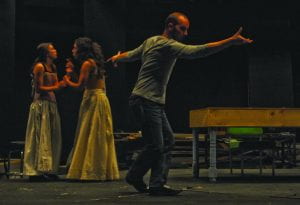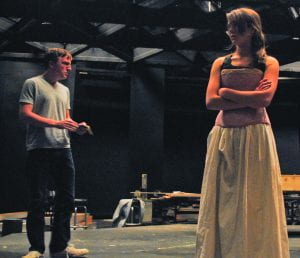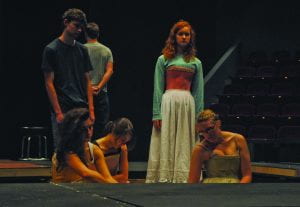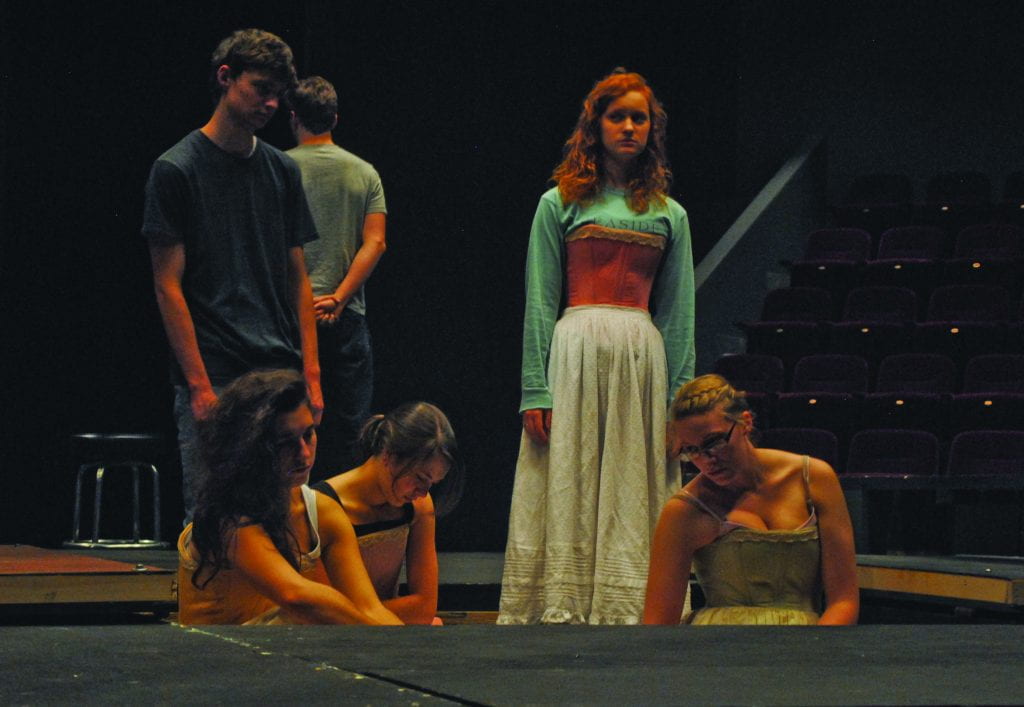By COURTNEY LUCAS – CENTO WRITER
The academic year is in full swing. Students continue with their schedules and routines day-in and day-out, consumed with homework, studying, sports practices, and club meetings.
But few students are busier than the cast of the fall play.
As a group, the actors and crew members rehearse between two and four hours for six days each week as part of a regular rehearsal schedule in order to prepare this year’s fall play of Our Country’s Good, which will be performed in Weisiger Theatre on Nov. 13-16.

The play, written by Timberlake Wertenbaker, is based on the novel tited The Playmaker by Thomas Keneally. For this dramatic production, the task of the student ensemble is to transport the audience to Australia during the 1700s when the continent was still a prison colony run by the Royal Marines of Great Britain. The premise of the play revolves around the governor of the colony deciding that it would be beneficial for the prisoners at the time to perform George Farquhar’s play The Recruiting Officer.
Charles T. Hazelrigg Professor of Dramatic Arts Patrick Kagan-Moore, who is the director of the fall play, described the theme behind the production as one of crumbling social norms in a new and foreign environment far away from Britain.
“The class distinctions and the social rules and niceties and expectations that they brought with them from England naturally begin to break down under the pressure of being so far away from home,” Kagan-Moore said. “The relationships that exist in this very isolated pocket, 15,000 miles away from home, begin to put real pressure on the class system and on how the rule of law is going to be interpreted and brought to bear in that place.”
Although set in Australia, the play hits close to home in more ways than one.
“This is a play that, in a lot of ways, reflects the very kind of pressures that [the student] generation is just used to,” Kagan-Moore said. “In a lot of ways, I think people are going to see human souls living in an environment, making the kinds of adjustments that you’re called on to make every day.”
As a member of the audience on the night of the performance, one is only able to see what happens on the stage between the opening of the curtains and the final curtain call. Hard work and attention to detail are no strangers to those actors working behind the scenes. During a flawless and polished performance, the precision and energy of the actors may make it easy to forget the preparation and background work that must be completed before the long-awaited opening night.

“The play for [the fall semester] was chosen in the spring [of the last academic year] and designers were contacted at that time as well,” senior and stage manager Hallie Forbess said. “The director and designers start their work a few weeks or months before rehearsals begin.”
Once the play is chosen, it is then time to choose the students who will be responsible for bringing the concept and words to life.
“[A] really impressive group of students turned out to audition for this play,” Kagan-Moore said. “The audition process includes quickly preparing a short scene and performing it before the director and stage manager.”
The play has been chosen, the set and costumes designed, and the actors have auditioned. At this point in the rehearsal process, the cast collectively reads the script in order to understand the general tone and content of the play.
“The cast has [read] through the script together—not moving around, not worrying about accents or inflections, just getting a feel for the play,” Forbess said.
According to Kagan-Moore, rehearsals take between six-and-a-half and seven weeks “because that’s what I want for the actors and what they want for themselves, which is excellence.”
Besides memorizing lines, many other elements factor into the acting and rehearsal process.
Junior Steven Maddox commented that the process of perfecting the infections and intonations of the dialect has proven to be an in-depth challenge.

“We have to look into accent work because [the director and stage manager] want us to have authentic accents,” Maddox said. “That’s going to be a challenge, especially for Josh.”
Junior Joshua Jerome will be the face and voice of three characters in the performance. Having to juggle the task of portraying multiple personas has required “a lot of thinking about [character] motivations.”
However, despite the time-intensive task of organizing and producing a theatrical performance, there is fun to be had and friendships to be formed.
“I think working with other people is the best part. [As a cast member], we get to work with some really cool people,” Maddox said. “You get to spend a couple hours with them doing something that you love.”
Similarly, Kagan-Moore’s favorite part of directing a Centre play is “working with the students, always, always, always.”
Being part of a Centre production is more than providing entertainment to the audience. Contributing to the process requires attention to detail as well as persistence, but the experience also promises lasting relationships and good times.
“Putting on a play is physically and emotionally draining,” Forbess said, “and it’s worth every moment.”
